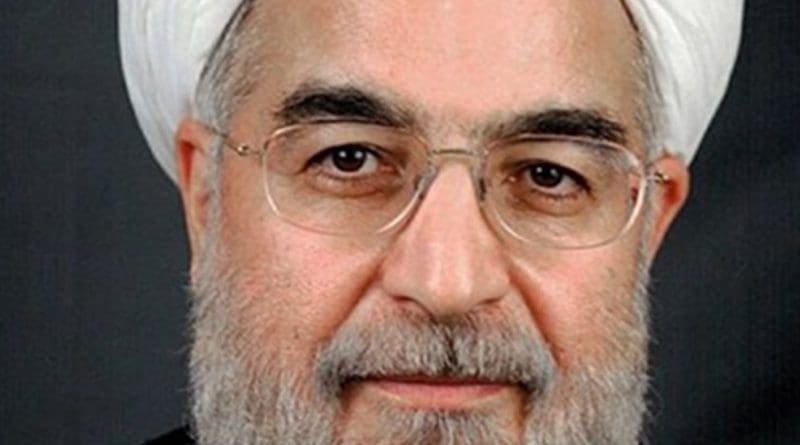Iran’s Rouhani Deserves A Second Term – OpEd
Dr. Hassan Rouhani deserves a second term as Iran’s president and the overall sum of his accomplishments during his first term are, indeed, quite impressive and need to be sustained for another four years.
As the presidential race in Iran gets underway, it is time to reflect objectively on the record of Rouhani administration and draw the necessary balance sheet with respect to both domestic and foreign affairs. This is undoubtedly an important task that requires proper methodology, historical perspective, and a correct assessment of the internal and external sources of areas of weakness or lack of accomplishment, otherwise we are bound to make the mistake of placing blames on the administration rather unfairly.
Without a doubt, the Rouhani administration deserves credit for ending the long-standing nuclear crisis that had crippled Iran’s economy and isolated the country in the global community as a result of robust international sanctions. As a result of the sanctions, particularly on the energy sector, Iran’s OPEC status slipped and the economic consequences were multiplied by the time Dr. Rouhani came to the office in Summer, 2013 on a direct pledge to end the nuclear standoff and deliver good nuclear news within the first one hundred days as president. The President delivered on his promise, initially with the Geneva interim agreement of November 2013, followed by the final agreement in July 2015, which went into effect shortly thereafter.
In historical retrospective, the nuclear deal known as the Joint Comprehensive Plan of Action (JCPOA) is a crowning achievement of Iran’s diplomacy, masterfully orchestrated by President Rouhani, thanks to his previous role as Iran’s chief nuclear negotiator a decade earlier. Steered by Rouhani’s pragmatism and implemented by the brilliant hands of the nuclear team led by the veteran diplomat Dr. Mohammad Javad Zarif, Iran’s new nuclear diplomacy has yet to be fully appreciated in Iran for all its skillful “smart” diplomacy that yielded significant positive results.
The latter included the following: (a) the sanctions wall fell down and the global consensus behind it evaporated; (b) the UN Security Council resolutions under Chapter VII were rendered basically inoperative, a huge diplomatic achievement; (c) overnight Iran turned into a global “emerging market” instead of being a taboo, reflected in literally thousands of foreign trade delegations visiting Iran since the JCPOA’s adoption; (d) the threat of war hovering over Iran’s head constantly throughout the nuclear crisis vanished; (e) Iran’s regional standing experienced a rapid improvement despite the animosity by the Saudi-led bloc; (f) Iran was able to reap other windfalls from the nuclear deal, such as by participating in the international peace process on Syria, which culminated in the Iran-Russia-Turkey initiative of the Astana rounds.
Needless to say, we must adopt a process-oriented approach when discussing the nuclear agreement that has a life-span of 10 years or so, particularly since the JCPOA is fragile and still under verbal assault by the Trump administration, which has nonetheless agreed to stick with it, per a recent G7 statement. The American record on the JCPOA so far leaves a lot to be desired but, on the whole, Iran’s Deputy Foreign Minister Abbas Araghchi has confirmed that the US has complied with the JCPOA obligations. The continuation of non-nuclear, so-called “primary sanctions” definitely pose a problem, just as US’s new post-JCPOA sanctions over Iran’s missile tests also complicate the picture.
Since the JCPOA was narrow-focused on the nuclear issue, the continuation of US hostility toward Iran is not surprising and, from Iran’s vantage, poses a foreign policy problem that pre-dated Rouhani. Hence, with respect to any assessment of the Rouhani accomplishments, we must take into consideration the external pressures and threats that have continued even after the JCPOA, which ought not to be confused with the weaknesses of Rouhani administration.
On the economic front, Iran’s ability to free its oil and gas sector from the web of sanctions, to regain its OPEC status, to attract foreign capital, to sign hundreds of trade agreements with foreign companies and other nations, etc., must be credit to the astute Rouhani administration, rightly boasting of record economic growth last year.
Undoubtedly, there are some valid criticisms in terms of a feeble anti-corruption and high unemployment, and the lack of a coherent industrialization policy, but such criticisms pale in comparison to the glowing achievements mentioned above, some of which have only begun to show themselves as they take time. If given chance for a second term, President Rouhani is apt to double its present efforts to fix the economy and to continue the present pattern of luring foreign economic partners while seeking a calm regional environment conducive to Iran’s economic growth. Modernizing Iran’s tax structure is long overdue and, perhaps, Rouhani can address this important issue in his second term, taking on some mega projects such as new water channels and the like is also an attractive option.
A key advantage of Rouhani’s second term is to assure continuity in Iran’s economic and trade policies, which is highly important in order to bolster Iran’s economy by implementing many memoranda of understanding on economic cooperation which have been signed since the JCPOA and, for one reason or another, remains on the paper.
Improving business confidence is a sine qua non for economic growth and the Rouhani administration is now well-poised to harvest a great deal more from the JCPOA during his second term should he be given the mandate to do so by the voters in Iran. A strong show of support for Rouhani is also a key factor, letting the world know that Iran is determined to continue on the course of history charted by its leadership, which has made Iran into a preeminent Middle East power today.

